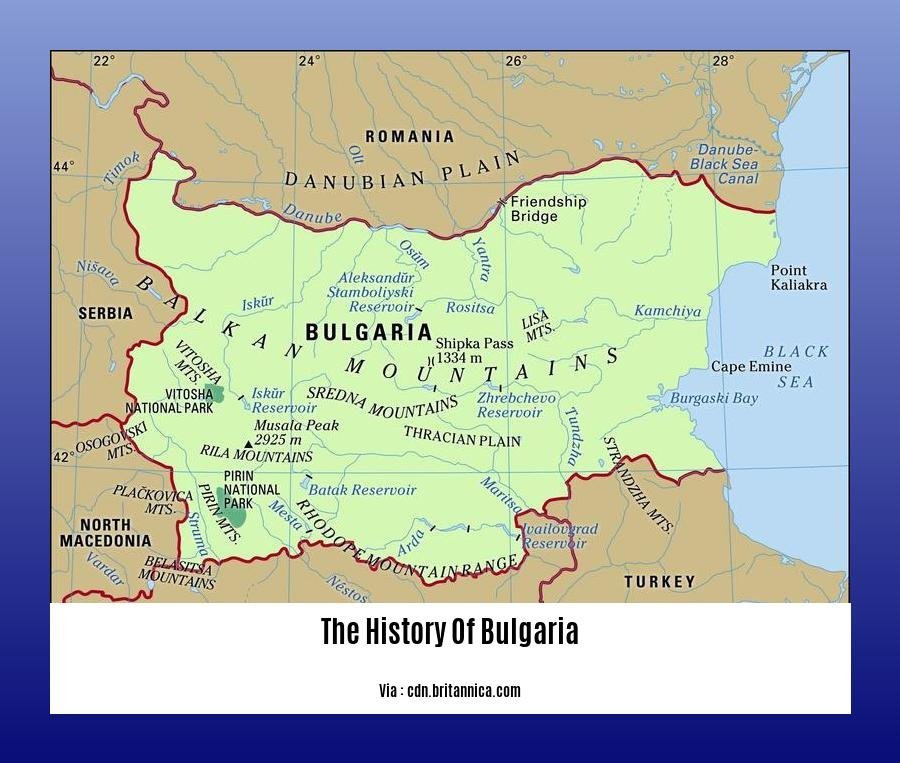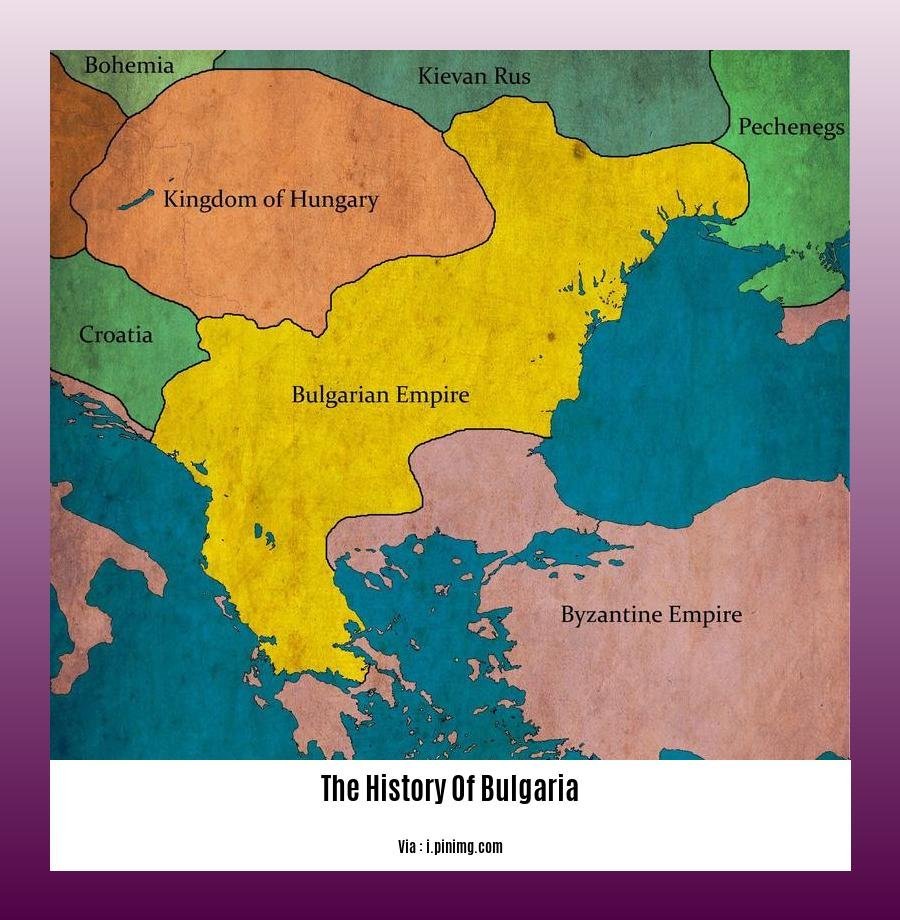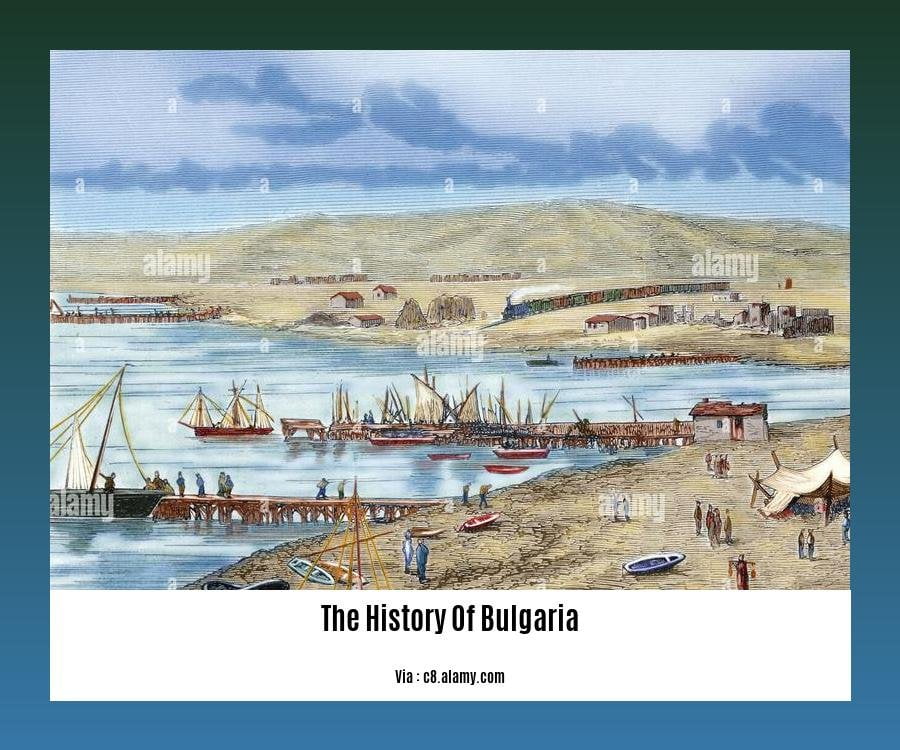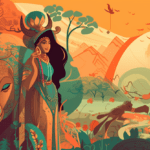Let’s dive into the exciting and fascinating story of Bulgaria! From its humble beginnings to its modern-day achievements, Bulgaria’s past is like a colorful and intricate tapestry, full of fascinating events and incredible stories. We’re going to take you on an incredible journey through time, uncovering the rich history and culture that makes Bulgaria so unique.

Unraveling the Tapestry of Bulgaria’s Past
Let’s embark on an exciting adventure through the pages of Bulgaria’s history. It’s a story filled with thrilling conquests, unwavering resilience, and remarkable transformations.
Ancient Ancestry
Bulgaria’s roots stretch back to the dawn of time. In the Stone Age, skilled warriors and artisans known as the Thracians left their mark on the land. Over time, Greeks, Romans, and Byzantines added their own flavors to the Bulgarian cultural melting pot.
Medieval Splendor
Fast forward to the 7th century, and Slavic tribes emerged, founding the First Bulgarian Empire. For over six hundred years, Bulgaria thrived under enlightened rulers like Simeon I, a champion of learning and the arts. But like all good things, the empire’s golden days came to an end with the Ottoman conquest in the 14th century.
Ottoman Rule
For nearly five centuries, Bulgaria found itself under Ottoman rule. It was a period of both oppression and cultural exchange. Bulgarian craftsmen became masters of metallurgy, pottery, and textiles, enriching the Ottoman empire’s artistic heritage.
National Awakening
In the 19th century, a fire of nationalism ignited in Bulgaria’s heart. By 1878, they had fought their way to independence from Ottoman control. The newfound nation faced its share of challenges, including wars and political turmoil. But it also embraced modernization and economic growth.
World Wars and Communism
Bulgaria made an unfortunate alliance with Nazi Germany in World War II, a choice that came with devastating consequences. After the war, it fell under Soviet influence, becoming a communist state. This era brought advancements in industry but also stifled political freedom.
Democracy and Beyond
In 1989, Bulgaria broke free from communism and embraced a democratic path. It joined NATO and the European Union, forging new alliances and becoming a respected member of the global community. Today, the country stands as a modern, vibrant nation, celebrating its rich history and embracing the future with optimism.
| Eras of Bulgarian History | Key Events |
|---|---|
| Paleolithic Era | Early human settlements |
| Thracian Period | Skilled warriors and artisans |
| Greek, Roman, Byzantine Rule | Cultural influences |
| First Bulgarian Empire (7th-13th centuries) | Rise of Bulgaria as a major power |
| Ottoman Dominion (14th-19th centuries) | Subjugation and cultural exchange |
| Independence and Modernization (19th-20th centuries) | Struggle for freedom and economic growth |
| Communist Era (1944-1989) | Soviet influence and political oppression |
| Post-Communism (1989-present) | Democracy, NATO and EU membership, economic revival |
- Do you know the intriguing tale behind the creation of the Bulgarian caves? Discover the fascinating history that shaped these underground wonders!
history of the bulgarian caves
- Explore the hidden depths of Bulgaria’s wondrous caves and uncover a world of natural beauty. Dive into the intriguing legends and myths that surround these subterranean masterpieces.
- Unravel the captivating mystery of the Bulgarian people’s origins. Embark on a journey through time and uncover the secrets of their ancient roots.
Where Did The Bulgarians Come From
- Delve into the rich history of the Bulgars, tracing their footsteps from the steppes of Central Asia to the heart of the Balkans. Unravel the fascinating story of their migration and settlement.
Where Did The Bulgars Come From

What Role Did the Bulgars Play in Bulgarian History?
Imagine a group of adventurous nomads from the steppes of Central Asia traveling westwards, their destiny intertwined with the fate of a future nation. That’s the story of the Bulgars, who came to be key players in the making of Bulgaria.
The Bulgars, a semi-nomadic people, arrived on the scene around 681 AD and joined forces with the local Slavic and Thracian populations. Together, they forged the First Bulgarian Empire under the leadership of Khan Asparuh. This was no ordinary kingdom; it was the very first Slavic nation-state in history, a groundbreaking moment for Slavic civilization.
As the 9th and 10th centuries unfolded, Bulgaria’s star rose under the wise rule of emperors like Boris I and Simeon I. The empire spread its wings across vast territories, engaged in thrilling clashes with the mighty Byzantines, and became a force to be reckoned with in the region.
Enter Saints Cyril and Methodius, brilliant Bulgarian scholars whose impact extended far beyond their homeland. They dedicated their lives to spreading Christianity among the Slavs and created the Cyrillic alphabet, paving the way for Slavic literacy and education. Their legacy lives on in the many languages that use this alphabet today.
As time went by, the Bulgars seamlessly blended into the Slavic majority, adopting their language and way of life. Despite their relatively small numbers, they left an indelible mark on Bulgarian identity and culture. Their contributions to the Bulgarian state, the embrace of Christianity, and the birth of the Slavic alphabet stand as testaments to their profound influence on the nation’s destiny.
In a Nutshell:
- The Bulgars established Bulgaria’s first nation-state in 681 AD.
- Bulgaria reached its golden age under emperors Boris I and Simeon I.
- Saints Cyril and Methodius played a crucial role in spreading Christianity and creating the Cyrillic alphabet.
- The Bulgars assimilated into the Slavic population, shaping Bulgarian identity and culture.
This is the legacy of the Bulgars, a nomadic people from Central Asia who traveled far and wide, leaving an enduring impression on the history of Bulgaria and the development of Slavic civilization.
What were the causes and consequences of the Khazar pressure on Bulgaria?
Imagine Bulgaria like a kid at school who’s constantly being bullied by a bigger and stronger kid. That’s what it was like for Bulgaria when they had to deal with the Khazars, a nomadic group who were intent on making their mark in the region.
Why were the Khazars bothering Bulgaria?
Well, for starters, they wanted more land. Like a hungry lion, they were looking to expand their territory and Bulgaria was right there for the taking. Plus, Bulgaria was like a big trading hub, so the Khazars wanted to get their hands on the money that was flowing in and out of the country. To top it off, Bulgaria had its own problems with different leaders coming and going, which made it easier for the Khazars to pick on them.
What did this mean for Bulgaria?
It wasn’t pretty. The Khazars would ride into town, steal stuff, and generally make life miserable for the Bulgarians. This led to lots of fighting, which cost Bulgaria land and people. It also put a damper on their relationships with other countries because they had to be nice to the Khazars to keep them from causing more trouble. On the upside, though, the Bulgarians and Khazars did share some culture, which is like when you learn a new word from a friend you don’t really like.
So what’s the bottom line?
The Khazars were hungry for land and power, and Bulgaria was an easy target. The Bulgarians had to deal with raids, lost territory, and a broken economy. But even in the midst of all that chaos, they managed to pick up some new ideas from their enemies.
How did the formation of the First Bulgarian Empire (Danubian Bulgaria) shape Bulgaria’s history?
Picture this: a land where different cultures have come together like a colorful quilt. That’s Bulgaria, a country with a history as rich as a tapestry. And one of the most important chapters in that story started around the year 681 AD.
The First Bulgarian Empire: A Crucible of Cultures
Back then, a new empire was born along the Danube River. It was a melting pot of different people: Slavs, Thracians, and Bulgars, each with their own unique traditions. As they lived together, their cultures started to mix and blend, like different colors on a palette.
Over time, the Slavic influences became stronger and stronger. The people started speaking a common language and feeling like they belonged to the same nation. That’s how Bulgaria was born, its identity forged in the heat of cultural fusion.
A Turning Point for Bulgaria’s Destiny
More than just a cultural milestone, the First Bulgarian Empire was also a major political turning point. It was under the leadership of Khan Asparuh that the Bulgars took control of the land between the Balkans and the Danube. This was a huge deal, because it gave Bulgaria a solid foundation on which to build its future.
Key Points to Remember:
- The First Bulgarian Empire brought together Thracians, Slavs, and Bulgars, starting a process where they all became more like each other.
- The empire helped create the Bulgarian language and nation, as Slavic dialects became the common tongue.
- Khan Asparuh’s leadership gave Bulgaria the territorial foundation it needed to thrive as a nation.
Additional Reading:
First Bulgarian Empire – Wikipedia
FAQ
Q1: When was the First Bulgarian Empire established?
A1: The First Bulgarian Empire was established in 681, when the Bulgars under Khan Asparuh settled between the Balkans and the Danube.
Q2: What were some of the key events that shaped the early Bulgarian Empire?
A2: The early Bulgarian Empire was marked by constant warfare and expansion, including the migration of the Bulgars across the Danube in the late 7th century. Internally, the 8th and 9th centuries witnessed the assimilation of the Bulgars into the Slavic majority.
Q3: How did the Bulgarian language and nation emerge?
A3: The Bulgarian language and nation gradually formed from the 7th to 9th centuries as non-Slavic tribes adopted the Slavic language.
Q4: What was the significance of the Bulgarian Patriarchate?
A4: The fully independent Bulgarian Patriarchate was recognized in 927, marking an important milestone in the development of the Bulgarian nation and its independence from the Byzantine Empire.
Q5: What are some of the major periods of Bulgarian history?
A5: Key periods in Bulgarian history include the First Bulgarian Empire (681-1018), the Second Bulgarian Empire (1185-1396), Ottoman rule (1396-1878), and the modern Republic of Bulgaria (established in 1990).
- Crypto Quotes’ Red Flags: Avoid Costly Mistakes - June 30, 2025
- Unlock Inspirational Crypto Quotes: Future Predictions - June 30, 2025
- Famous Bitcoin Quotes: A Deep Dive into Crypto’s History - June 30, 2025
















